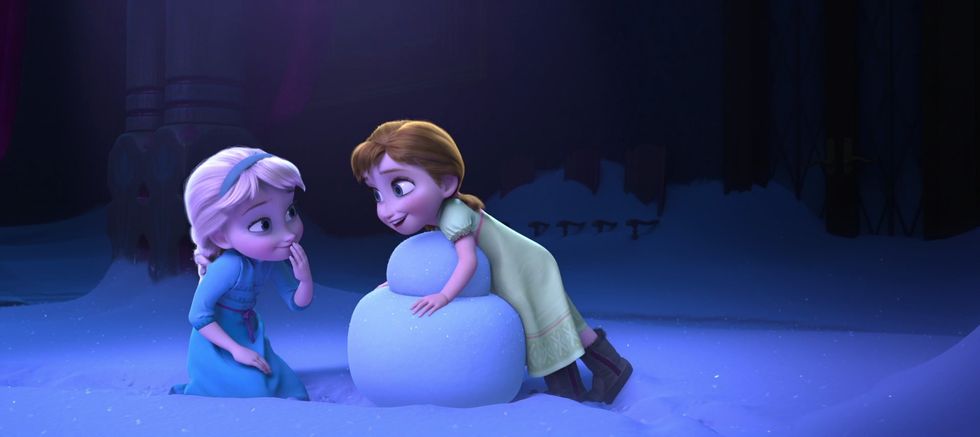When you’re three years old, you want to do everything your five-year-old sister does. Your bed sheets match (pink, Ballerina Barbie), you dress alike (in different colors, because you don’t like blue and she does), you share toys. If she has Cocoa Puffs for breakfast, you want the Cocoa Puffs. If that’s the last bowl, you cry and complain until you get her bowl. Even if she doesn’t have the cereal anymore, you got the one that she wanted, and that’s what you want.
When you’re seven years old, you want to be your nine-year-old sister. You follow her across the street to play with her older, fourth grader friends even though one has a sister your age, but you crave their approval. One of her friends, who knows the words to the “Entertainer” song, teaches you how to ride a two-wheeler. His reminder is still a mantra every time you sit on a bike seat (“I gotta go completely straight”). You end up using the bike of the friend’s sister that’s your age, and momentarily you feel bad that her older sister doesn’t make an effort (or is forced) to include her like your sister does you.
When you’re eleven years old, you start to grow tired of being compared to your thirteen-year-old sister. Elementary school was to be expected, in such a small town. The teachers personally know your parents. The science teacher actually taught your father. And yes, maybe you thought that particular science teacher liked your sister better than you, and maybe it wasn’t fair that her kindergarten teacher became your first-grade teacher because you were compared to her every. Single. Day. Middle school, though, in a newer, bigger state, is a whole new ball game. You’re used to introducing yourself (first and last name) and getting “hey! I know your sister”, but at this point it’s getting irritating. You have far more important things to worry about: figuring out what the heck one-way hallways are supposed to be, trying to grasp why a “gifted” sixth grade science class was a low-level, introductory, high school biology course, and trying to fit in. Your sister is the last person you want to be.
When you’re fourteen, you find yourself picking up your sixteen-year-old sister’s habits from when she was fourteen. This is the beginning of both your Harry Potter phase and your pop-punk phase. Your phone background and twitter profile picture and house key are all exclusively pink and black, and involve either hearts or cutesy skulls with eyelashes and hair bows. Music you found annoying and repetitive when you were twelve is loud and exciting now that you’re fourteen. Boys Like Girls becomes your favorite band; there is something about Love Drunk, and blasting a curse word through your headphones until they burst that just makes you feel alive. You go through too many pairs of headphones that year.
Around fifteen, you start to resent your seventeen-year-old sister. Why should you have to cover for her while she goes out with her friends, and stays out past curfew? How come you’re stuck doing her chores nearly every weekend on top of your own? You can’t be the only one to walk the dog. You start to notice that her life is better than yours. One elementary school, one middle school, one high school. You had to bounce around because of moving, and extensive bullying from your own cousin that reached a point where you couldn’t escape it even at home, because she was there too. She lived right down the street. So, your parents start feeling guilty. Guilty because you couldn’t go and enjoy yourself because your sister always did, and someone had to set the table (that, and you don’t have very many friends). They start taking you out on Walmart trips with them. Occasionally, you would ask for a book or a t-shirt, and they would give in because they had just given your sister money to go to the beach. Your sister starts to resent you. Why do you get everything? Mom and dad buy her nothing. It’s a vicious cycle.
When you’re sixteen, you are without your sister for the first time. As an eighteen-year-old, she is off to college. As much as you resented her, you can’t help but miss her. You accidentally pull out four plates for dinner, and heave a little sigh as you put one away and set the table for three. Though she has long since moved into her own room, your room feels empty, somehow. You make a reference to something funny during dinner, but your parents don’t understand it, because it’s something that only you and her share. You try to remember to tell her about it during your next phone call, but she is always just running out the door or just at dinner, and she’ll ‘call you back later, okay?’ By the time she calls back, you forget what you had to say. During vacation, you try to spend every waking moment you can with her, as she is always busy. But it’s worth seeing her every time, because you missed her too much.
At twenty-one, your best friend is your twenty-three-year-old sister. You live in two different states, and the last time you saw each other was during your mom’s birthday in October. But what does that matter? Distance means nothing. She’s your best friend, no doubt about it. You listen to her complain about work and her boyfriend while you ask her advice about college. Sometimes she still gets on your nerves, like in March when your parents were going down south to visit her for your dad’s birthday. You casually mention that you wish you could be there too, and she responds with “I don’t, you get mom and dad all to yourself all the time”. At the same time, though, you wouldn’t be who you are without her.
















